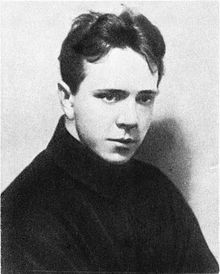Dave and I saw an early preview of Theater Rhinoceros’s production of The Habit of Art at the Eureka Theater last Friday evening.
This is a fairly recent comedy by Alan Bennett, about an imagined meeting between Benjamin Britten and W. H. Auden late in their lives. Auden is living in semi-retirement at Oxford; he’s bored and feeling like a has-been, and he’s eager to find something new and exciting to work on, even if it’s dangerous; Britten, on the other hand, is still busy and much sought after, and he has such a project — he’s starting work on an opera based on Thomas Mann’s Death in Venice — but he’s skittish about the subject matter, a man in late middle age who develops an obsession with an underage boy he sees at a hotel while vacationing in Venice. Britten fears the public might turn on him, and he wants to make the boy older, closer to adulthood, and to present the older man’s attraction as one of chaste appreciation of classical beauty. (Britten is a homosexual and a teacher of boy singers; he feels an infatuation for some of his underage students himself, and his behavior with some of them — not overtly sexual but not entirely innocent either — has already led to private gossip, though never a public scandal; so the very thing that draws him toward the subject matter also cuts uncomfortably close to home.) Auden urges Britten to be honest about both the boy’s age and the sexual element in the attraction. Auden would love to write the libretto; Britten has already chosen to work with a writer who is much less talented but will give him the less dangerous, more comfortable libretto that he wants.
Except that it’s more complicated than that, because The Habit of Art is really about a rehearsal of a play about this imagined meeting, so there are layers of reality that interrupt each other, with the actors breaking character frequently to argue with the playwright or to complain about the director’s choices or to ask the stage manager where they’re supposed to be standing now.
Dave and I saw this production at Z Space a couple of months ago and enjoyed it a lot; we’d meant to go back for a second look and weren’t able to get around to it, so we were very happy to see that it’s getting another month or so of performances at the Eureka Theater. The acting is really terrific. The play itself is very funny, some of it in a very silly, farcical way, some of it affectionately satirizing the foibles and weaknesses of artists; and yet at the same time it’s a sort of rambling meditation on how to make art when you are past the years of your greatest glory but you still have the habit. When you’re much venerated for what you’re already done, working in your own shadow, do you repeat what has worked well for you in the past, or attempt something that’s exciting and new but dicey and that could fail very badly, maybe not just embarrassing you but even damaging your reputation? The theme echoes and re-echoes in subtle ways through all the various levels — the play-within-a-play, the actors’ complaints about the writing, the playwright’s complaints about the direction, the stage manager’s attempts to soothe everyone and keep the rehearsal on track.
It’s a dense, thoughtful, complex, and very funny play. If you’re a fan of plays by Tom Stoppand and Caryl Churchill, you’ll probably like this, too. If you’re on a tight budget like us, discounted tickets are available through Goldstar.



